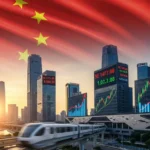Key Points:
- Chinese EV makers are expanding globally despite increasing tariffs from the U.S. and EU.
- Companies like BYD invest in local production facilities to mitigate tariff impacts.
- The U.S.-China trade war has previously impacted Cisco’s revenue and market participation in China.
- Wong is hopeful for a recovery in Cisco’s China business and expects faster growth in the coming years.
Cisco is expressing strong optimism about its expanding business with Chinese electric vehicle (EV) manufacturers as these companies push their operations overseas, according to Ming Wong, Vice President and CEO of Cisco Greater China. The EV sector is now Cisco’s second-largest segment in the region, primarily driven by manufacturing companies, with electric cars leading within this category.
Over the past year, Chinese EV makers have accelerated global expansion in response to intensifying domestic competition. Despite escalating trade tensions, which have seen the U.S. and potentially the European Union increase tariffs on Chinese electric cars, this growth is not expected to slow down. Chinese automakers, such as BYD, mitigate these challenges by investing in local factories abroad.
Cisco, which provides networking equipment and software solutions, is collaborating with over ten electric car customers to support the establishment of factories, offices, and research and development centers overseas. “So far, we haven’t received any indications from our EV customers that they plan to halt or slow down their investments due to these trade issues,” Wong stated. “In fact, the opposite is true. They are pushing forward aggressively.”
Shiv Shivaraman, Asia region leader and managing director at consulting firm AlixPartners, noted that while the precise financial impact of this business expansion is uncertain, it will likely drive significant capital expenditures in manufacturing and office infrastructure. He suggested that tariffs might accelerate this spending.
Cisco has faced challenges in the Chinese market due to increasing reliance on domestic companies by the U.S. and China for national security reasons. In 2019, Cisco CEO Chuck Robbins highlighted the significant impact of the U.S.-China trade war on its business, with a 25% drop in revenue in China for the quarter ending in July 2019. Robbins mentioned that state enterprises excluded Cisco from bidding processes, and carrier sales declined sharply.
Despite these setbacks, Wong remains hopeful for a rebound in Cisco’s China business this year. He emphasized that state-owned and private businesses are turning to Cisco as they expand globally. Cisco also benefits from collaborations with Chinese internet giants like Alibaba, which are expanding internationally. Additionally, Cisco’s ability to connect different graphics processing unit (GPU) providers, especially in a market where AI giant Nvidia faces restrictions, is proving advantageous.
In the latest quarterly report ending in April, Cisco’s total revenue declined by 13% year-over-year, with a 12% drop in the Asia-Pacific, Japan, and China regions. Wong attributed this decline to a high comparative base and expects revenue growth to accelerate in the next one or two years.





